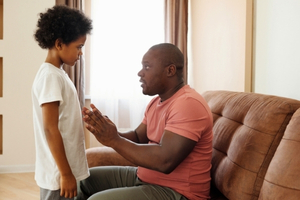
Hey there, Black families! Let’s have a conversation about something that probably hits close to home—parenting styles. Specifically, there is ongoing debate over whether the way our parents raised us (good ol’ “old-school” parenting) is better or worse than the approaches we use today. You’ve probably heard it all before: “Back in my day, we didn’t talk back,” or “Kids today don’t know how to respect their elders.” Sound familiar?
It’s a real conversation in many Black households, whether you’re reflecting on your childhood or thinking about how you’re raising your kids. There’s always this lingering question: Which parenting style builds stronger Black families?
So, let’s examine old-school vs. new-school parenting and determine what we can learn from each to raise confident, resilient, and loving Black children.

If you grew up in a Black household in the ’70s, ’80s, or ’90s, chances are, old-school parenting ruled your life. This style was all about respect for elders, strict discipline, and tough love. The phrase “spare the rod, spoil the child” was more than a saying—it was a way of life.
How many times did you hear, “Because I said so,” when you questioned a rule? Or maybe you remember those moments when “getting a beating” wasn’t just a threat. Old-school parenting didn’t leave much room for explanations or emotional discussions. The focus was on following rules, staying in line, and—most importantly—keeping the family name strong.
For many Black families across the diaspora, this style of parenting had deep roots in survival. Our ancestors faced slavery, colonization, and institutionalized racism that required strict rules and respect to keep families safe and intact. Black parents weren’t just raising children—they were raising survivors who had to navigate hostile and unfair societies.
Take for example how many of us grew up with that constant warning: “Don’t embarrass me in front of these white folks.” It wasn’t just about discipline—it was about protection. Parents knew that being labeled as “the troublemaker” could follow Black children for life. So, they parented tough. They wanted us to stay on the straight and narrow because veering off that path could be dangerous, particularly for Black kids.
But let’s be real—while old-school parenting had its strengths, it also had its downsides. Sure, you learned to respect and discipline, but maybe you also learned to bottle up your emotions. There wasn’t always space to express how you felt, because that wasn’t the priority. You knew you were loved, but maybe you didn’t always feel seen in the ways you wanted to be.
And sometimes, the punishments were harsh. Take for instance that time when your cousin got in trouble at school for talking back to a teacher. Rather than having a conversation about what led to the outburst, the focus was solely on punishment—being grounded for weeks, maybe even getting whipped with a belt. The intention was to correct the behavior, but it might have left them feeling unheard and hurt. These methods often came from a place of fear—fear of what the world would do to a Black child seen as “out of line.”

Fast forward to today, and you’re probably seeing a very different parenting style in Black families. New-school parenting leans heavily into emotional awareness, open communication, and fostering independence in kids. You’re not just telling your kids what to do—you’re explaining the “why” behind it. You’re not just shutting down their feelings—you’re encouraging them to express themselves, even when it’s uncomfortable.
The shift from “Because I said so” to “Let’s talk about it” is a big one. In new-school parenting, you’re raising children to think critically, understand their emotions, and ask questions. You want them to be independent thinkers, not just rule-followers.
For instance, when your child acts up in school, instead of immediately grounding them or doling out punishment, maybe you sit them down and ask, “What happened today? How were you feeling when that happened?” You’re giving them space to reflect, and you’re teaching them that it’s okay to talk about their feelings. This approach creates a relationship built on trust, rather than fear.
The hope with new-school parenting is that this emotional connection builds a stronger, more supportive family unit. You’re not just raising kids who respect authority—you’re raising kids who respect themselves, communicate their needs, and aren’t afraid to be vulnerable.
But let’s not ignore the critics. Maybe you’ve heard older family members say things like, “These kids are too soft,” or “Kids today have no respect for their elders.” The belief here is that in focusing so much on emotional well-being, new-school parenting might be losing some of the structure and discipline that held Black families together for generations.

So, which one is better—old-school or new-school parenting? Honestly, the answer probably lies somewhere in the middle. You don’t have to choose between being strict and being understanding. The most successful Black families today likely draw from both approaches, creating a balance that works for their kids and the times we’re living in.
Think about it like this: There’s nothing wrong with teaching your kids the value of respect, discipline, and hard work. Those are values that have helped Black families survive and thrive through some of the hardest times in history. But at the same time, today’s world is different. Our kids need emotional tools to handle the challenges they face now. They need to know it’s okay to cry, to ask for help, and to speak up when they’re struggling.
It’s like when you take the time to sit your child down after a tough day at school. You tell them, “I know you’re upset, but there’s a way to handle it without getting into trouble.” You’re balancing the lesson of discipline with emotional support, and that’s powerful.
At the end of the day, whether you lean more towards old-school or new-school parenting, the goal is the same: You want to raise strong, resilient, and loving Black children who know their worth and can navigate the world with confidence. You want to protect them from the harsh realities of racism, while also giving them the emotional skills to thrive despite it.
So maybe the question isn’t, “Which is better?” but “How can we take the best from both?”
Teach your kids to respect themselves, their elders, and their culture—but also teach them to express their emotions and stand up for themselves. Discipline them when necessary, but make sure they know they can come to you when they’re struggling, and that your love is unconditional.
Black families have always been strong because of their ability to adapt and grow. And this moment is no different. You’re writing your parenting playbook, one that draws from the wisdom of the past while embracing the possibilities of the future.
And that’s what builds stronger Black families—strengthening roots while allowing new branches to grow.
4-minute read Have you ever found yourself lying awake at night, heart heavy with worry about your teenager’s safety during interactions with the police? It’s a question that lingers for many parents and caregivers, especially when history and statistics both
4-minute read I’ve spent a lot of time thinking about beauty—what it means, who gets to define it, and whether it’s really as inclusive as we like to think. And the more I look at it, the more I realize
4-minute read Let’s be honest—the Hidden Agenda Behind Beauty Ads is everywhere. They follow us on our phones, pop up in our social feeds, and even sneak their way into our subconscious when we least expect it. One minute you’re